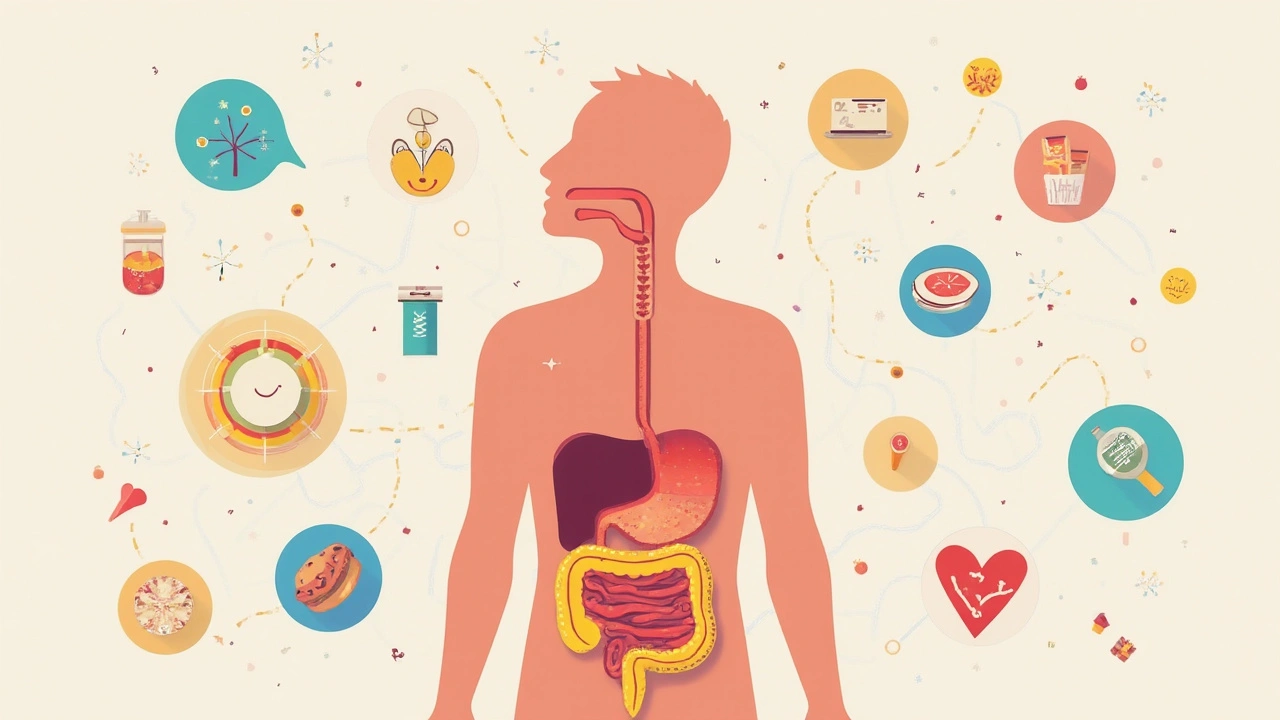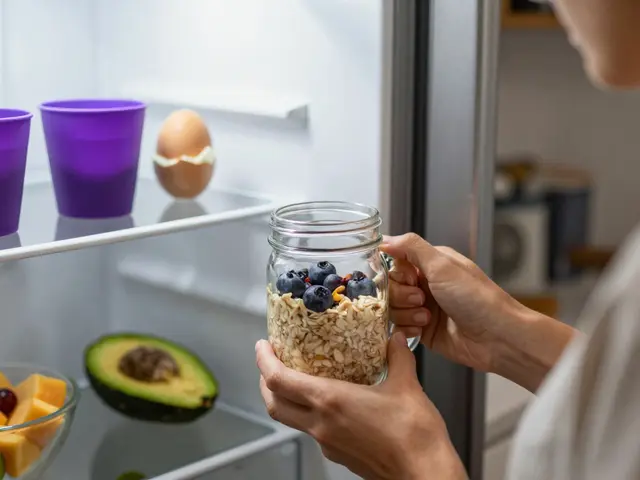Your gut isn’t just about avoiding tummy aches—you’d be surprised at how much it affects everything from your mood to your daily energy. If you always feel tired after eating, or you’re dealing with bloating that won’t quit, that’s your gut talking. Turns out, about 70% of your immune system actually hangs out in your digestive tract. So, when your gut is off, the rest of you feels it too.
Want a simple gut check? Look at your plate today. Crammed with greasy takeout or heavy on processed snacks? That’s where the trouble often starts. People who switch up just one meal a day—maybe swapping chips for yogurt or adding some veggies—see real changes, fast. And you don’t have to go all-in on fancy diets; even easy changes like drinking more water or adding a daily probiotic can seriously shift how you feel.
There’s more to the story, from hidden signs of gut problems to the link between your stomach and your mental health. If you ever blame stress or poor sleep for feeling bad, your digestion could be the real culprit. The good news? Small actions today add up fast, and your gut starts getting happy almost right away once you treat it better.
- How Your Gut Affects You Every Day
- Real Food, Real Changes
- Signs Your Gut Needs Help
- Build Healthy Habits That Last
How Your Gut Affects You Every Day
Most people think of their gut only when something goes wrong—like stomach pain or heartburn. But your gut is working 24/7 and its health can change the way you feel every single day. Around 100 trillion bacteria call your gut home. That’s more microbes than there are stars in the Milky Way! These bugs don’t just help with digestion. They talk to your brain, help your body fight sickness, and even play a role in your mood. Fun fact: scientists call this the “gut-brain axis,” and it's why a stressed-out gut sometimes means an anxious mind.
Here’s what really stands out—about 70% of your immune cells are in your gut. If your gut is healthy, you’re more likely to shake off colds quickly and stay well during flu season. Studies also show people with a balanced gut microbiome tend to have more energy and sharper focus. Plus, your gut helps you absorb vitamins and minerals from food. If it’s not working right, all the salads in the world aren’t going to help much.
Check out a few real-life ways your gut health messes with or boosts your daily life:
- Bloating or discomfort after meals can mean your gut bacteria are out of balance.
- Feeling sluggish in the middle of the day? Your gut could be struggling with too much sugar or unhealthy fat.
- Even your sleep can tank if your gut health is thrown off, since gut bacteria help produce melatonin (the sleep hormone).
- Poor gastro health can show up as skin problems like breakouts or dryness.
Take a look at these quick stats to see how gut health touches almost everything:
| Body Function | Gut Connection |
|---|---|
| Immunity | 70% of immune cells in digestive tract |
| Energy | Healthy gut boosts nutrient absorption |
| Mood | 90% of serotonin made in the gut |
| Sleep | Gut bacteria help with melatonin production |
If you’re not feeling your best, your gut could be the missing piece. The next time you feel off, tune in and ask your stomach what it needs.
Real Food, Real Changes
If you want better gut health, what goes in your mouth matters more than you think. Processed foods, sugary sodas, and fried stuff throw your gut off balance fast. Instead, opt for simple swaps—with real, whole foods taking center stage.
Fiber is a huge deal for your gut. It acts like a broom that sweeps through your system, keeping things moving and making your gut bacteria happy. You’ll find fiber in beans, lentils, oats, apples, carrots, and greens. People who eat enough fiber (about 25 grams a day for women—most of us don’t get even close) have fewer tummy troubles, more energy, and even better skin.
"Healthy eating patterns, such as those high in fiber, have been linked to lower rates of many digestive issues and chronic diseases." — Harvard T.H. Chan School of Public Health
Fermented foods—like yogurt, sauerkraut, and kimchi—bring good bacteria right into your system. That’s great news because a happy gut crowd crowds out the bad stuff. Yogurt with live cultures is a super easy add. Just keep an eye out for sneaky added sugars.
- Eat a variety of colors—different fruits and veggies mean a wider range of gut-friendly nutrients.
- Go easy on red meat and processed meats (like hot dogs). These have been linked to more digestive issues and even increased cancer risk.
- Try swapping refined grains (white bread, white rice) for whole grains for more natural fiber.
- Drink plenty of water—your gut needs it to move things along smoothly.
Here’s a quick look at foods that help—vs. those that hurt—your gut:
| Gut-Friendly Foods | Gut-Unfriendly Foods |
|---|---|
| Yogurt (with live cultures) | Sugary cereals |
| Oats | Fried snacks |
| Carrots | Processed meats (sausages, hot dogs) |
| Lentils and beans | Soda and sugary drinks |
| Leafy greens | White bread |
The biggest takeaway? If you build most of your plate from real food and keep the packaged stuff for rare treats, you're already doing a favor for your gastro health. Try a new veggie this week, or snack on nuts instead of chips. Habits like these don’t just help your gut—they make you feel good all over.

Signs Your Gut Needs Help
Your body usually waves a red flag when your gut needs a checkup. Most people brush off these clues, chalking them up to a “bad meal” or just stress. Here’s what you really need to watch for if you care about gastro health and feeling good every day.
- Bloating and Gas: If you’re constantly uncomfortable or gassy after meals, your gut bacteria could be out of whack.
- Irregular Bathroom Habits: Going too often or not enough? Both constipation and diarrhea are classic signs your digestive system is struggling.
- Frequent Heartburn: Regular burning or discomfort in your chest after eating is your gut’s way of saying “help.”
- Strange Food Cravings: Especially sugars and carbs. A gut that’s off can send weird messages leading you to crave junk food.
- Low Energy or Feeling Blah: If you feel wiped even when you’re getting enough sleep, your gut may not be absorbing nutrients right.
- Skin Breakouts: Your gut and skin love to gossip. Acne, rashes, and eczema flareups can all reflect stomach trouble.
- Unexplained Weight Changes: Losing or gaining weight without trying sometimes links back to how your gut handles food.
- Bad Breath: No matter how much you brush, ongoing bad breath could come from gut problems, not your mouth.
- Brain Fog or Mood Swings: Those gut-brain connections are real. Anxiety, crankiness, or trouble thinking straight are signals things are off inside.
Sound like you? Loads of people ignore these hints, but here’s a reality check: about 1 in 4 adults in the U.S. deals with some gut issue every year. Here’s a quick look at why these signs matter.
| Symptom | What It Might Mean | How Common |
|---|---|---|
| Bloating | Too much processed food, not enough fiber, or food intolerance | Up to 30% adults weekly |
| Constipation | Dehydration, stress, lack of movement | About 16% adults |
| Heartburn | Poor food choices, being overweight, gut acid problems | 1 in 5 adults monthly |
| Acne/Eczema | Food sensitivities, imbalanced gut bacteria | About 10-20% of people with gut issues |
It’s way easier to fix gut trouble when you see the signs early. The main thing? Don’t wait for those symptoms to turn into bigger problems. Start with your daily routine, and pay real attention to how your body reacts to what you eat and drink.
Build Healthy Habits That Last
So how do you make gut-friendly changes and actually stick with them? The trick is keeping things practical and not overloading your routine. Most folks quit healthy habits because they go too hard, too fast, or get bored. Slow and steady wins the gut race.
- Gastro health wins start in your shopping cart. Fill most of your basket with whole foods—think fruits, veggies, yogurt, and oats. Gut bacteria love fiber, and adults should aim for about 25–30 grams per day. Most Americans only get about half that.
- Hydration makes a difference. People who drink at least eight glasses of water daily report less bloating and better regularity, according to the CDC. If you always forget, set an alarm or use a marked water bottle.
- Messed-up sleep equals a cranky gut. Studies show poor-quality sleep can change your gut bacteria in as little as two nights. Shoot for 7–8 hours when you can.
- Movement matters, too. Even 20–30 minutes of brisk walking lowers chances of constipation and supports smoother digestion.
| Habit | Result | How Fast You'll Notice |
|---|---|---|
| Add more fiber | Better digestion, less bloating | 3–7 days |
| Drink water regularly | More energy, regular bowel movements | 1–2 days |
| Sleep 7+ hours | Less gut irritation | 1–3 nights |
| Probiotics daily | Fewer stomach issues | 2–4 weeks |
Stack these habits—start with one for a week, then add another. If you miss a day, just get back on track without beating yourself up; consistency is what matters. Your gut will thank you, and the ripple effects show up in everything from your mood to your immunity.





